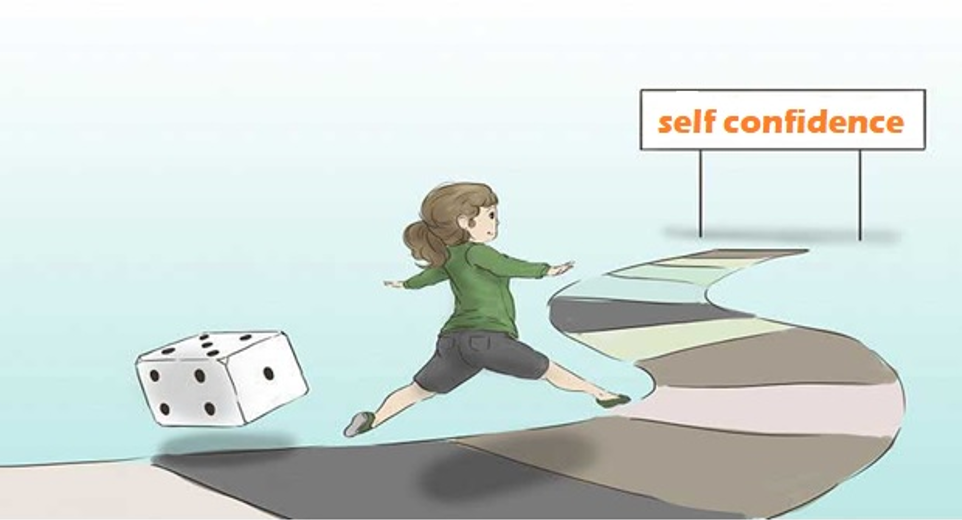Part of the book,365 steps to self confidence and Building Your Self-Confidence.
This book tackles self-confidence and self-esteem. It discusses how you can develop yourself to be more aware of your behavior, responses and how to be more confident.

There are many examples, exercises and advices given to further evaluate your confidence level and what you should do for your confidence and self-esteem to grow.
How to build self confidence
Bear in mind that you have the capability to attain whatever goals you set for yourself but you have to believe first that you can do it. Make the decision to be confident. Imitate the famous people and act as if you are confident even if you’re not. The reality is that many of these famous people are shy but they act as if they are not and succeed. Do not put yourself down. Choose to love and respect yourself and allow only the best to happen to you.

If you’ve ever watched a successful athlete prepare for his or her event, you’ll have seen true confidence in action. They are determined, and believe without a doubt that they will make the shot, run their fastest, jump their highest, achieve victory –they will be their best. They know they will succeed. They also know that if they don’t make it this time, they will learn from it and get better. That’s confidence. But confidence not only helps you succeed, it has its own magnetism. And, of course, the better you perform, the more successes you enjoy and that builds your confidence even further. When you’re confident, you’re attractive and alluring. Other people want to be around you. It’s a necessary quality for leadership[2].
Albert Bandura is one of the leading researchers into self-efficacy. His self-efficacy theory explains the relationship between the belief in one’s abilities and how well a person actually performs a task or a range of actions. Bandura says that ‘self-efficacy’ and ‘confidence’ are not quite the same thing. Confidence is a general, not a specific, strength of belief. On the other hand, self-efficacy is the belief in one’s capabilities to achieve something specific. If people have high self-efficacy in an area, then they think, feel, and behave in a way that contributes to and reinforces their success, and improves their personal satisfaction. They’re more likely to view obstacles as challenges to overcome, so they aren’t afraid to face new things. Therefore, self-confidence –by way of self-efficacy –often affects how well you perform, and how satisfied you are with the choices you make[2].
Building Self-Confidence
You can learn to believe in yourself and be your own best cheerleader. You’ve got to drive the insecurities away and start focusing on what you do really well. Here, we’ve brought together four great exercises that will help you uncover the talents within you, and learn how to translate those into an abundant source of confidence that you can dip into whenever you need a boost. You’ll practice:
Reminding yourself of previous successes, Envisioning a successful future for yourself, Reframing past misses[2].
Self-confidence is vitally important for your success. Without it you’ll struggle to persist, and you won’t get what you want. Ome people seem to be born with an abundance of selfconfidence, however, thank fully, this isn’t a genetic predisposition –it’s something that has developed in them, and can develop in you[2].

How confident are you?
When we talk about self-confidence, self-image and self-esteem is not far behind. They are related to self-confidence. Self-image is how you perceive yourself to be. It consists of three core feelings:
Self-worth or the value you put in yourself.
Competence or your capability to succeed, work out hardships, and the ability to think for yourself.
Belonging or others’ acceptance and respect.
The result of the evaluation of your self-worth and belonging serves as a basis for your self-esteem. Your ultimate objective is to be confident, not only in your outward appearance but deep inside you.
You must imagine yourself as a confident person. Lastly, do not stop with imagination but act confidently. You should be happy and satisfied with your physical characteristics, your emotional state, your intellect and your social skills. Keep in mind that your capabilities are far more than what you give yourself credit for.
Confidence is not hereditary. Although genes and hormones affect you, these are not part of the root of confidence. Confidence is learned over time. Only you can foster your self-confidence. It’s your life, think and act for yourself.
Self-love
You must first love yourself in order for you to know your self-worth. Loving yourself is essential to love others. It will be impossible to love another person if you don’t love yourself. How can you possibly give what you don’t have? When you begin to love yourself, changes for the better will happen[1].
Take a risk
In order to gain confidence, you will need to face obstacles and take risks that attract failure. Take the risk and confront your fears. You are not perfect and you will eventually make mistakes but just to be yourself and brave your fear is sufficient[1].

The four step method
There is a four step method in combating negative thoughts. They are:
- Be mindful. Be aware to your thoughts, feelings and reactions to circumstances and people around you.
- Stop disempowering thoughts.
- Replace them with empowering thoughts.
- Keep going until it becomes automatic.

Sources:
- Preston, D. L. (2005). 365 Steps to self-confidence. How To Books.
- James Manktelow, CEO, Mind Tools.Com
peresent by Saeid Tousheh Asl

